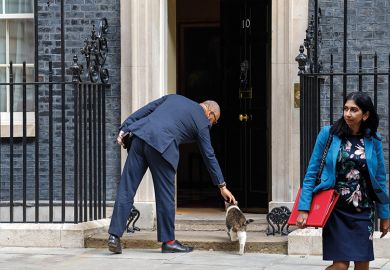When I, a German citizen, accepted an academic contract at a UK university, I had never heard of the Immigration Health Surcharge (IHS); neither my academic interviewers nor HR even mentioned it. Only at the point of submitting my Skilled Worker Visa application did I realise I would have to pay more than £3,000 upfront.
At first glance, the IHS – introduced in 2015 and extended in 2021 to include Europeans – seems justifiable. Clearly, people using the National Health Service should contribute to it financially. However, academic immigrants already pay the same taxes as everyone else. Having lived in six countries on three continents, I can say that while health insurance is generally required, it is not normal to make immigrants pay twice for the same service.
It is quite an outlay, too. Since you must pay the £1,035 a year fee (up from £200 when it was introduced) in advance for every year of your visa, that amounts to £3,105 for a three-year visa – and more if you have dependants. This is on top of the visa fee, ranging from £719 to £1,500. For early-career academics on a Skilled Worker Visa, such sums can amount to more than a month’s salary, making it difficult to cover additional initial expenses, such as accommodation and transport – especially for people from low-income countries. So much for equality, diversity and inclusion!
Even when you have paid, you have to start saving up to do it again if you intend to renew your visa. For me, that came sooner than expected because I changed university two years before the end of my first visa, but the academic who offered me the job had not heard of the IHS and, crucially, HR didn’t tell me that I would have to pay for an entirely new visa, including another IHS, even though I had already paid the charge for most of the period in question. The best advice I can give to fellow immigrants is not to change institutions unless your current visa is ending.
Some in the UK worry that the IHS will discourage talented overseas academics from coming. But conversations with many colleagues at various institutions reveal that ignorance about the IHS is widespread, among both international job applicants and UK-based academics. Even the minority who have heard of the IHS have no idea how expensive it is. Perhaps that is because new international staff often prefer to keep quiet about it because of the shame evoked in some cultures by talking about money and falling to victim to what, in essence, is a scam.
People wonder why international staff end up paying the money anyway. The answer is that it is only at the very last stage of the visa application process that you learn about the IHS and the requirement to pay all dues before the application can even be submitted. By this stage, you have typically already signed a contract and obtained your sponsorship certificate, all of which is needed to start the visa process. And, as in my case, you may also have rejected job offers from other countries, handed in your notice and put your UK move in motion. You are beyond the point of no return.
As researchers, we are aware of the importance of making informed decisions, a standard we apply in our research with human subjects. It is unethical not to extend overseas academics the same courtesy. After all, while ignorance may be widespread among academics, HR has no such excuse. Yet it seems to be common for them not to mention the IHS even when issuing contracts and providing guidance on the visa application process.
I suppose from their perspective, it could harm the “business” to be open about the IHS and the university’s unwillingness – with the occasional notable exception – to cover it (although some offer loans). But such omissions leave recruits with a bitter taste of deceit and exploitation even before they enter the UK. Is this practice even lawful?
Whoever wins the general election should reconsider the situation facing the individuals who have been chosen, via highly competitive international processes, to educate UK students and contribute to a functioning UK society. At the very least, the Home Office should reimburse double payments when visas overlap.
As for universities, if they will not cover IHS costs, they must tell international applicants about the charges, at the latest, when making job offers. Academics on hiring committees should mention them, but, ideally, applicants should hear about them even earlier. For instance, in response to my awareness-raising, the University of Reading’s School of Psychology and Clinical Language Sciences is creating a new job template to increase transparency about the costs non-British scholars should expect. This will be made available for others to use.
Surely it is not too much to ask that overseas academics’ working relationships with UK universities begin on the basis of trust – not with a sense of having been duped? Let’s all do what we can to spread the word about the IHS and help push for a solution.
Tanja Wingenbach is a lecturer in psychology at the University of Reading.
Register to continue
Why register?
- Registration is free and only takes a moment
- Once registered, you can read 3 articles a month
- Sign up for our newsletter
Subscribe
Or subscribe for unlimited access to:
- Unlimited access to news, views, insights & reviews
- Digital editions
- Digital access to THE’s university and college rankings analysis
Already registered or a current subscriber?








